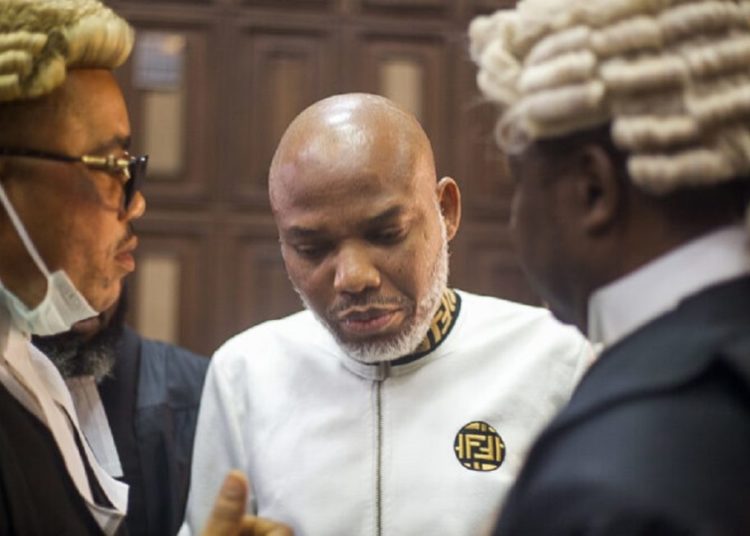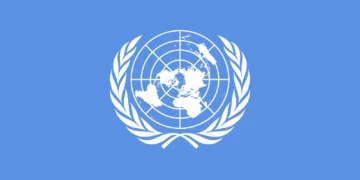The re-arrest and repatriation of the self-acclaimed leader of the banned Indigenous Peoples of Biafra (IPOB), Nnamdi Kanu, has sparked a wide range of reactions. Some have compared the news with the attempt by some persons in General Muhammadu Buhari’s (as he then was) government to repatriate politician Umaru Dikko in a crate from the UK through the backdoor after the fall of President Shehu Shagari’s government in 1983. Others believe that Nnamdi Kanu’s repatriation spooks tyranny in the most atavistic way.
This newspaper disagrees with these increasingly dominant narratives. We think they are dangerous and wrong-headed and this is why. About four years ago, Nnamdi Kanu who was standing trial on 11 counts of treason, treasonable felony, terrorism and illegal possession of firearms, among others, jumped bail and fled abroad. In any serious country, that alone, is a serious offence.
But in the odyssey of this self-enchanted and delusional young man, who obviously thinks of himself as Nigeria’s version of Enersto “Che” Guevara, jumping bail is the least of the charges that would be brought against him. As he transmuted from ethnic warlord to “rabbi” and on to the supreme leader of IPOB, complete with the costume and accoutrements of office, Nnamdi Kanu infused his comments, widely distributed through social media and online radio, with incendiary rhetoric. He unapologetically incited violent retribution against perceived enemies of his cause.
If Nnamdi Kanu started as a lone, misguided ranger, he has somehow managed from the comfort of his foreign hideout and with the additional benefit of dual nationality, to at- tract an army of impressionable young people, mostly from the South East. These foot-soldiers, waving a flag and the dream of Eldorado, appear ready and willing to put themselves and society in harm’s way to indulge Nnamdi Kanu’s deranged fantasy of Biafra.
From his base abroad, he is widely and reasonably believed to have repeatedly issued threats and incited violence not only against ethnic groups that resent his vision of Biafra, but even against anyone or institution that appears to stand in his way, however remotely. That is unacceptable. Thanks to Nnamdi Kanu’s unrestrained rhetoric, and the conspiratorial silence of his enablers, the South East has become a war zone. The escalation of violence in that region this year alone has led to hundreds of deaths of innocent people (residents and indigenes alike, a number of them murdered in the most horrendous ways); jailbreaks; arson; deadly attacks on security personnel and state institutions; and avowals of more attacks. With increasing banditry and deadly attacks in many parts of the country, the nation’s security woes have never been more dire.
No government worth its name, even in a small letter “g”, would allow the perpetrators of such mayhem to go unpunished or shirk the prospects of pursuing them wherever they may be hiding, smoking them out and bringing them to justice. As is often the case with opportunistic politicians across the country – and the South East does not have a monopoly of them – a section of the elite in that region nurtured and indulged Nnamdi Kanu to feather their own political nest. Now, the monster they reared not only threatens them; the falcon can no longer hear the falconer. What began as a tiny spark threatens to consume the South East and the whole country.
We cannot continue this way. Nnamdi Kanu has reportedly boasted that he had the support and protection of some western governments to pursue his violent agenda. To demonstrate that he is “in charge” there have been online broadcasts, allegedly linked to him, in which he announced a lockdown of states in the South East, imposed curfews, proclaimed a fatwa on some political leaders, and declared others persona non grata.
That is not separatist agitation; it’s a declaration of war! Also, to achieve his ambition of a breakaway homeland, he even held a livestreamed joint conference in April with Cho Ayaba, leader of Ambazonia, a Cameroonian-based separatist group committed to the violent overthrow of the Cameroonian government. How this rabble-rouser and war-monger assumed the status of the champion of the cause of the South East – one of the most advanced, industrious and resourceful ethnic groups in the country – is a cautionary tale to enablers of rabid nationalism in other parts of the country. It’s funny that while Nnamdi Kanu’s sympathisers applaud his audacious misadventures, they are quick to cricitise and criminalise the international collaboration that led to his re-arrest and repatriation.
Funny. There are many things that President Muhammadu Buhari’s government could be criticised for and we are among the first to say, without equivocation, that the management of diversity on Buhari’s watch has been nothing but disastrous. A few of the President’s comments during ethnic flare-ups, his kid-gloves handling of the farmer-herder conflict, and his nepotism have inflamed ethnic tensions and widened already fraught divisions. Without a doubt, the South East and minorities up and down the country (including, in fact, sections of the much-maligned core North) have been shortchanged by the tone-deafness of Buhari’s government, not to mention its incoherent economic choices.
This was not what Buhari promised the country in 2015 or when he was reelected in 2019. But there’s hardly any- thing that justifies the scale of the mayhem that could be linked to Nnamdi Kanu’s insane rhetoric. He is not wanted because he is espousing a separatist agenda: the pantheon of Nigeria’s radical school – from Wole Soyinka to Edwin Madunagu and Bala Usman is full of persons who maintained uncompromising alternative visions of society at great personal cost, but with regard to method. Nnamdi Kanu’s madness has no method.
He is wanted because he has become a clear and present danger to himself and to society. The moral equivalence of comparing Nnamdi Kanu’s repatriation with the government’s limited success in curb- ing Boko Haram and banditry begs the point. It plays to a hackneyed gallery where ethnicity gets the better of common sense and the larger public good. How long will Nigeria be hostage to such base sentiments? Press reports indicate that there has been disquiet in a few foreign countries – notably Kenya, which is speculated to have assisted in Nnamdi Kanu’s repatriation; and the UK, where he is also a citizen.
We see no need for either panic, squeamishness or exuberant interference. On the contrary, the repatriation of Nnamdi Kanu ought to be a welcome development for international collaboration. It should also be a symbolic reminder to perpetrators of vio- lence that while they may run and hide, one day, the long arm of the law will catch up with them. The question about whether he was “exported” or “repatriated” and where he should have been expelled are matters that would be decided by the court, with the benefit of arguments on both sides and the facts in full view.
That question cannot be the excuse for indulging one more day of potential vio- lence linked to a man whose next victims we can never be sure of. What the Buhari govern- ment owes Nnamdi Kanu is fair and open trial. Hustling him away into the courtroom as the government did last week and dodging questions about the circumstances of his arrest, send the unintended message that the government has something to hide. Nnamdi Kanu must be accorded the full rights and privileges of a suspect and kept safe and secure. Justice must not only be done; it must also be seen to be done.





